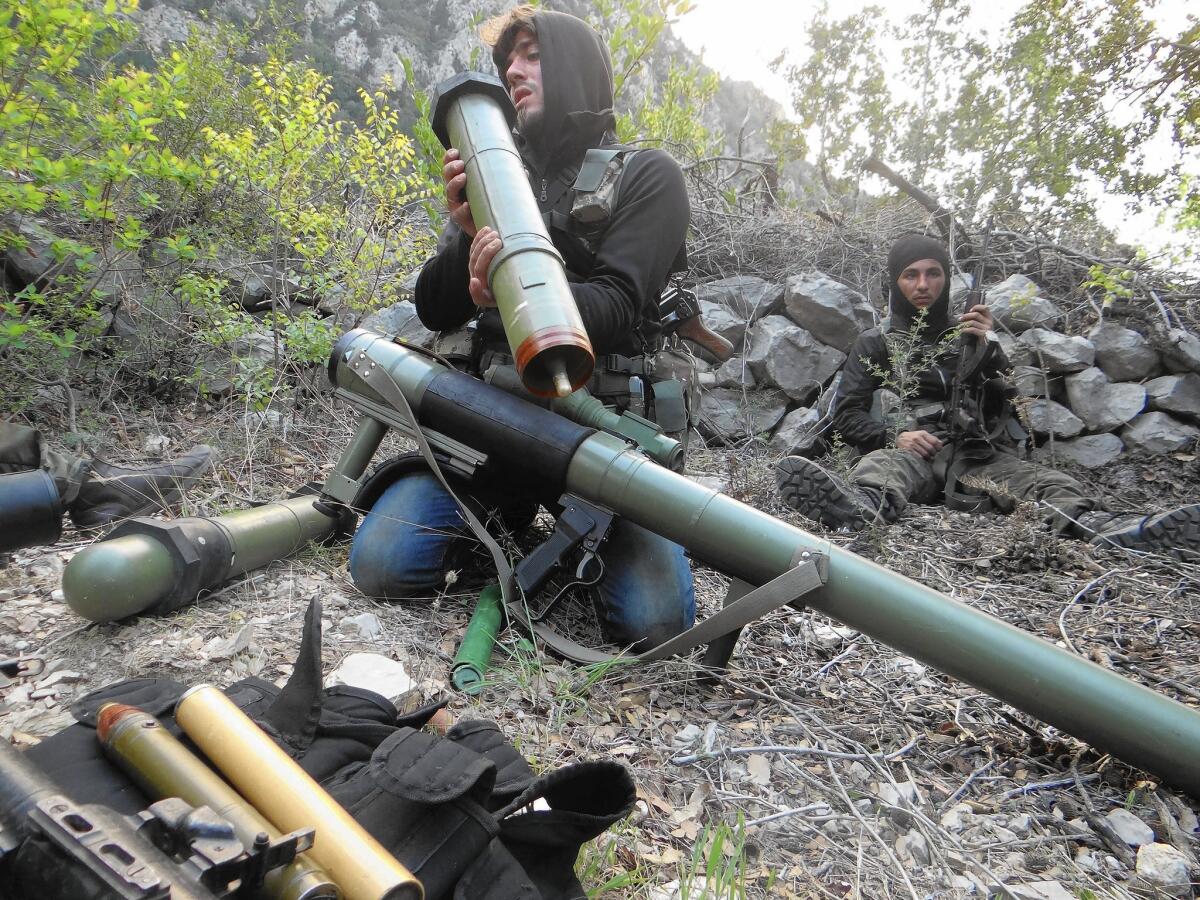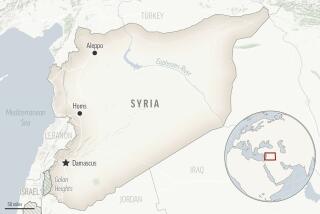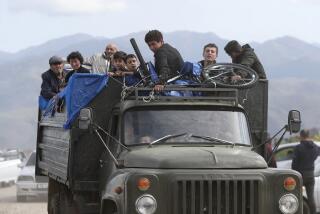Rebel assault on Kasab, Syria, revives dark memories for Armenians

BEIRUT — A rebel assault on the northern Syrian town of Kasab near the Turkish border has sparked a furor among Armenians worldwide and revived dark memories of the Ottoman-era genocide.
It’s unclear how many civilian casualties occurred in the previously tranquil home to about 2,500 Armenian Christians. But the incident, which has also heightened tension between Turkey and Syria, provides a sharp new focus for the propaganda wars between the government of Syrian President Bashar Assad and the disparate rebel forces that have been trying to topple him for three years.
It has also triggered a raging battle on social media, with pro-opposition activists on the defensive against what they call an Internet disinformation campaign by supporters of the Assad government. Syrian officials, meanwhile, have accused Turkey of backing an Al Qaeda-led offensive from its territory with tanks and aircraft.
Thousands of Syrian rebels, many of them with Islamist radical groups, including some linked to Al Qaeda, surged across the Turkish-Syrian border March 21 and seized a swath of mountainous territory in northwestern Syria’s Latakia province, including Kasab.
Many residents of the town have since fled, like their ancestors who survived the genocide of the early 20th century, joining the legions of Syrians displaced by the war. The United Nations says about 1,550 displaced families from Kasab are receiving aid in the city of Latakia, which is under Syrian government control.
The large-scale rebel strike appeared to catch the thinly stretched Syrian military off guard, though the government says its forces have won back terrain in a punishing counterattack close to the porous border. Fierce fighting continued Thursday, both sides said. An opposition monitoring group has reported more than 300 fighters killed, including rebels and loyalists, while pro-government activists have said that more than 1,000 rebels have been killed in almost two weeks of clashes.
On March 28, hundreds of protesters gathered outside the Turkish Consulate in Los Angeles to assail Turkey — which has called for Assad’s ouster and has long harbored rebel fighters — for helping facilitate the Kasab attack. Demonstrators waved U.S., Syrian and Armenian flags and hoisted signs bearing messages such as “Freedom from Turkish aggression.”
Among those plunging into the Internet fray is Kim Kardashian, a Los Angeles-based celebrity of Armenian heritage, who has sent out a number of messages on Twitter urging followers to marshal their mobile devices in support of Kasab.
“If you don’t know what’s going on in Kessab please google it, its heart breaking!” Kardashian tweeted, using an alternate spelling of the town’s name. “Let’s get this trending!!!!”
During the Syrian conflict, now in its fourth year, social media and the Internet have become virtual fronts in the war fueled by sectarian rivalries and the geostrategic interests of other nations. Each side has accused the other of inflammatory manipulation of online images and serial distortion of events in an attempt to score propaganda points.
In the case of Kasab, the painful history of Armenians in Turkey weighs heavily in the debate.
Armenian groups, scholars and many governments say Ottoman forces committed genocide against ethnic Armenians during and after World War I, killing more than a million people and driving multitudes from their homes, including many who ended up in current-day Syria. Turkish authorities have long denied any campaign of systematic extermination and say those who died were casualties of war, famine and disease.
Syria’s Christian minority is generally seen as backing the Syrian government, though many Christians also seek a more democratic leadership.
Elsewhere in Syria, Islamist radicals have defaced churches and kidnapped Christian clerics and nuns. A pair of bishops and an Italian Jesuit priest, Paolo Dall’Oglio, have been among those abducted, reportedly by Islamist rebels.
In Kasab, opposition forces have rejected Internet accounts of Christians being killed and churches being vandalized.
“Our battle is not a sectarian one,” Ahmad Jarba, head of the U.S.-backed Syrian National Coalition exiled opposition group, said during a visit this week to a rebel-controlled area in Latakia province, according to a video posted on YouTube. “Our battle is with this ruling mafia.... It is not with the Alawites, nor with the Armenians, or the Christians.”
Jarba’s visit highlighted the symbolic value the opposition places on maintaining pressure on Assad’s native province, which is also the homeland of his ultra-loyalist Alawite minority sect and of many commanders in the Syrian military and security apparatus. Still, experts say the likelihood of rebels pushing deep into heavily defended Latakia appears slim.
With government forces advancing on several fronts and many rebels turning in their weapons, the opposition has touted the Latakia offensive as evidence that it can still strike at Assad’s ancestral home and along the Mediterranean coast.
“Whoever thinks there is pressure on us to stop this battle is delusional and wrong,” Jarba told the rebels gathered for his visit.
His appearance also dramatized how even “moderate” U.S.-backed opposition groups like the Free Syrian Army — ostensibly under the umbrella of Jarba’s coalition — coordinate in the field with extremist Islamist factions. Both sides in the war have reported that the rebels fighting in Latakia include elements of Al Nusra Front, an Al Qaeda franchise deemed a terrorist organization by Washington. At least one Free Syrian Army-affiliated faction, the Syrian Revolutionary Front, is also participating.
In August, a rebel sweep into a different area of Latakia resulted in the executions of scores of pro-government civilians and the kidnapping of hundreds more, mostly women and children, in predominantly Alawite villages, according to an investigation by Human Rights Watch, a New York-based watchdog group. Many Alawite civilians remain hostages from that offensive.
U.S. officials who back the Syrian opposition have voiced concern about the makeup of the forces that overran Kasab. U.S. Sen. Robert Menendez (D-N.J.), who chairs the Senate Foreign Relations Committee, said in a letter to constituents that he was “gravely concerned” about reports of the attack “by Al Qaeda-linked terrorists based in Turkey.”
Times staff writer McDonnell reported from Beirut and special correspondent Bulos from Amman, Jordan.
More to Read
Start your day right
Sign up for Essential California for news, features and recommendations from the L.A. Times and beyond in your inbox six days a week.
You may occasionally receive promotional content from the Los Angeles Times.







